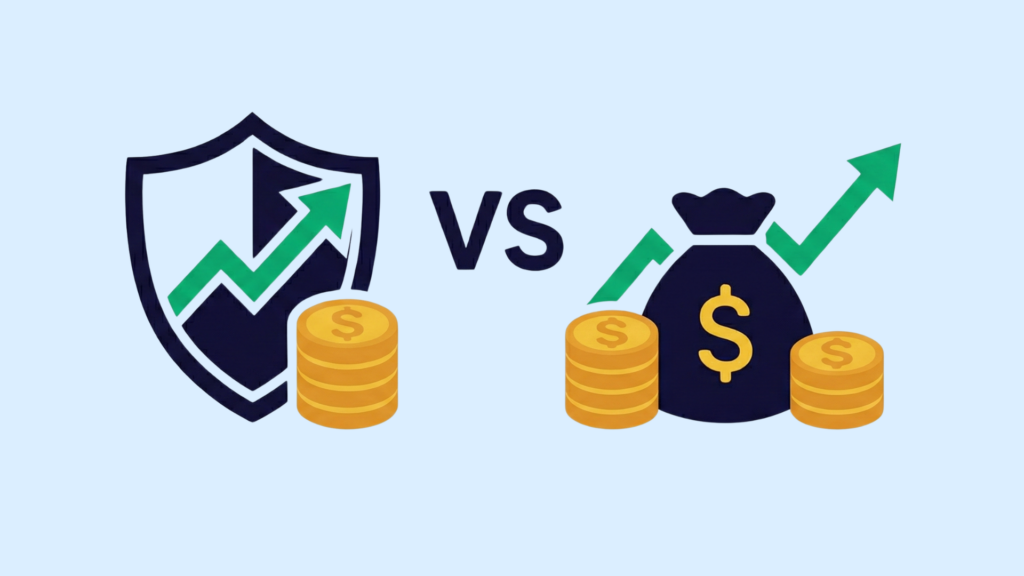Taxes can significantly impact the net gains from your investments, making it crucial to grasp the different tax treatments applicable to various types of mutual funds. Whether investing in equity, debt, or hybrid funds, knowing how short-term and long-term capital gains are taxed helps make informed decisions.
Essentially, effective financial planning involves not just choosing the right funds but also considering their tax implications. So, keep reading to learn how taxes can impact the returns on your mutual funds!
Types of Mutual Funds and Tax Implications
When investing in mutual funds, understanding the tax implications is as important as choosing the right fund. Both equity and debt mutual funds come with their tax treatments, which can significantly impact your returns.
Equity Mutual Funds
Equity mutual funds primarily invest in stocks, with at least 65% of their portfolio allocated to equities. If you sell your equity fund within a year, the gains are considered short-term and taxed at 15%.
However, if you hold your investment for more than a year, the long-term capital gains (LTCG) are tax-exempt up to ₹1 lakh annually; any amount above that is taxed at 10% without indexation benefits.
Debt Mutual Funds
Debt mutual funds invest heavily in fixed-income securities like bonds and government securities. For investments made after April 1, 2023, all gains from debt funds are treated as short-term and added to your taxable income, taxed at your applicable slab rate.
Previously, long-term gains (for holdings over 36 months) were taxed at 20% with indexation benefits, but this no longer applies, making debt funds less tax-efficient than before.
Tax on Dividends from Mutual Funds
Since the Finance Act of 2020, dividend taxation has changed, shifting the responsibility of paying taxes from the fund houses to the investors. This change has significant implications for your investment returns and tax planning.
Dividend Distribution Tax (DDT):
Before 2020, mutual fund dividends were subject to Dividend Distribution Tax (DDT), which meant fund houses deducted the tax before distributing dividends to investors. This system kept dividends tax-free in investors’ hands. However, the Finance Act of 2020 abolished DDT, altering how dividends are taxed and placing the tax burden directly on investors.
Dividend Tax for Investors:
Under the current tax regime, dividends received from mutual funds are fully taxable as income from other sources. The tax rate depends on your income tax slab, meaning higher-income investors may face a substantial tax hit.
Additionally, if your total dividend income exceeds ₹5,000 in a financial year, the Asset Management Company (AMC) must deduct 10% Tax Deducted at Source (TDS) before paying you. You can claim this TDS when filing your annual income tax return.
Capital Gains Taxation
Capital gains taxation on mutual funds is based on how long you’ve held the units and the type of mutual fund you’re invested in. This classification is crucial as it determines whether the gains are taxed as short-term or long-term.
Short-Term Capital Gains (STCG)
Equity Funds: If you sell units of an equity-oriented mutual fund within 12 months, the gains are considered short-term. These gains are taxed at 15%, irrespective of your tax bracket.
Debt Funds: For debt-oriented mutual funds, the holding period for short-term gains is less than 36 months (until March 31, 2024). These gains are added to your income and taxed according to your applicable income tax slab.
Hybrid Funds: The taxation for hybrid funds depends on their orientation. If the fund is equity-oriented, the same rules apply to equity funds. For debt-oriented hybrid funds, short-term gains are taxed per the debt fund rules.
Long-Term Capital Gains (LTCG)
Equity Funds: For equity-oriented mutual funds, any capital gains on units held for more than 12 months are considered long-term. These gains are taxed at 10% if they exceed ₹1 lakh in a financial year without the benefit of indexation (adjusting the purchase price for inflation).
Debt Funds: Long-term capital gains on debt-oriented mutual funds are applicable when units are held for more than 36 months (until March 31, 2024). These gains are taxed at 20% with the benefit of indexation, which can significantly reduce your tax liability by accounting for inflation over the holding period.
Note: Starting FY 2024-25, the holding period for long-term gains on debt funds will be reduced to 24 months, but the taxation benefits will remain unchanged.
Tax-Saving Mutual Funds
Tax-saving mutual funds are a solid option if you’re looking to reduce your taxable income while investing. These funds offer growth potential and come with tax benefits under some sections of the Income Tax (I-T) Act.
Equity-Linked Savings Scheme (ELSS):
Equity-Linked Savings Schemes (ELSS) are a popular choice for tax-saving investments. They invest at least 80% of their assets in equities and come with a range of benefits:
- Tax Deduction: Under Section 80C of the I-T Act, you can claim a deduction of up to Rs. 1.5 lakh for investments in ELSS. This deduction lowers your taxable income, helping you save on taxes.
- Lock-in Period: ELSS has a compulsory lock-in period of 3 years. You cannot withdraw your investment before this period but can take a loan against it if needed.
- Taxation on Returns: Gains from ELSS are subject to 10% Long-Term Capital Gains (LTCG) tax if they are more than Rs. 1 lakh in a financial year. There is no benefit of indexation for ELSS.
Other Tax-Saving Funds:
Apart from mutual funds, other fund options can help in saving taxes:
- Public Provident Fund (PPF): It’s worth mentioning for its tax benefits. Contributions up to ₹1.5 lakh are deductible under Section 80C, and the interest earned is tax-free.
- National Pension System (NPS): Contributions to NPS qualify for tax deductions under Section 80CCD(1) and 80CCD(1B).
- Tax-Saving Fixed Deposits (FDs): These offer tax benefits under Section 80C, though the interest earned is taxable.
Tax Efficiency of Mutual Funds
Maximising the tax efficiency of mutual fund investments requires careful planning and implementing strategies such as:
Holding Period
The holding period of your fund investments is critical in determining the tax rate on your gains. For equity-oriented funds, holding your investments for more than 12 months allows you to benefit from LTCG tax rates, generally lower than short-term rates.
Suppose you invest ₹5 lakhs in an equity fund, which grows to ₹7 lakhs after 14 months. Your taxable LTCG would be ₹2 lakhs, but if you sell within 12 months, the entire ₹2 lakh gain would be subject to a higher short-term capital gains tax rate.
Systematic Withdrawal Plans (SWPs)
Systematic Withdrawal Plans (SWPs) allow you to withdraw a fixed amount from your investments periodically. SWPs are a tax-efficient way to generate regular income because each withdrawal is treated as a combination of capital and capital gains. This reduces the tax burden compared to redeeming a large sum at once.
For example, if you set up an SWP to withdraw ₹10,000 monthly from a debt mutual fund, a portion of each withdrawal is your original investment, and the remainder is capital gains. Since capital gains on each withdrawal are smaller, you may stay within the lower tax brackets, reducing your overall tax liability.
Switching Between Funds
Switching between mutual funds can trigger capital gains tax, even if you’re reinvesting in a different fund within the same family. To minimise taxes, consider the following strategies:
- Timing the Switch: Switch from an equity fund after holding for more than 12 months or a debt fund after 36 months to take advantage of LTCG rates.
- Utilise Losses: Offset gains from switching by selling other investments currently at a loss. This can help lower your overall tax liability.
- Gradual Switching: Instead of switching the entire investment simultaneously, consider staggered switches over multiple financial years to spread the tax impact and possibly lower the cost.
The Bottom Line
Whether it’s the distinction between short-term and long-term capital gains or the impact of recent changes like the abolition of DDT, being aware of how different mutual funds are taxed can significantly affect your investment outcomes.
Appreciate can be your partner in managing investments with tax-efficient strategies. With its intuitive platform, you can easily monitor your portfolio, track holding periods, and make informed decisions to reduce tax burdens. Appreciate trading app also offers personalised insights to help you navigate complex tax rules, ensuring that your investments align with your financial goals while optimising tax savings.
FAQs
How are mutual funds taxed in India?
Mutual funds in India are taxed based on the type of fund and the holding period. For example, equity funds held for over 12 months are subject to Long-Term Capital Gains (LTCG) tax, while those held for a shorter duration incur Short-Term Capital Gains (STCG) tax.
What is the tax rate for long-term capital gains on equity mutual funds?
For equity mutual funds, long-term capital gains above ₹1 lakh are taxed at 10%. However, this rate will increase to 12.5% for gains realised after July 23, 2024.
How does the abolition of DDT affect mutual fund investors?
The abolition of the Dividend Distribution Tax (DDT) means that dividends received from mutual funds are now taxable in the hands of investors. This change places the tax burden on the investor, who is taxed at their applicable income tax slab rate.
Can I save taxes by investing in mutual funds?
Investing in Equity-Linked Savings Schemes (ELSS) can help you save taxes under Section 80C, with a deduction limit of up to ₹1.5 lakh. However, these funds come with a mandatory three-year lock-in period.
What is the tax treatment for dividends from mutual funds?
Following the abolition of DDT, dividends from mutual funds are now taxable according to the investor’s income tax slab rate. Investors must declare these dividends as income in their tax returns.























